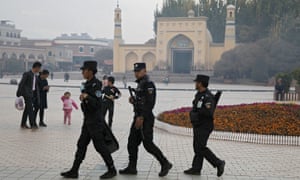Washington legislation allows US to freeze assets of Chinese officials it deems responsible for arbitrary detentions in Xinjiang region

Photograph: Ng Han Guan/AP
Beijing has criticised a new US law that would sanction Chinese officials over the mass incarceration of Uighurs and other Muslim minorities, saying it “maliciously attacks” China’s policy in the Xinjiang region.
China will “resolutely hit back and the US will bear the burden of all subsequent consequences”, the Chinese foreign ministry said in a statement after US President Donald Trump signed the Uighur Human Rights Act into law on Wednesday.
The statement came after secretary of state Mike Pompeo met with top Chinese diplomat Yang Jiechi, in Hawaii on Wednesday, during which Yang expressed “strong dissatisfaction” with the new law. They also discussed the need for transparency in tackling the coronavirus outbreak and “fully reciprocal dealings”, as the US put it, in terms of commercial, security, and diplomatic ties.
The legislation, which passed Congress almost unanimously, requires the US administration to determine which Chinese officials are responsible for the “arbitrary detention, torture and harassment” of Uighurs and other minorities.
The United States would then freeze any assets the officials hold in the US and ban their entry into the country.
China’s foreign ministry said in a statement that the act “rudely interferes in China’s internal affairs”, and urged the US to “immediately correct its mistakes”.
“This so-called act deliberately slanders the human rights situation in Xinjiang and maliciously attacks China’s policy in governing Xinjiang,” the ministry said.
Activists say China has rounded up at least one million Uighurs and other Turkic Muslims and is trying to forcibly assimilate them by wiping out their culture and punishing basic Islamic practices.
Beijing’s explanation is that it is running vocational educational centres that offer an alternative to Islamic extremism.
Trump signed the act just as excerpts emerged from an explosive new book by his former national security advisor John Bolton, who said the president told his Chinese counterpart Xi Jinping that he approved of the vast detention camps.
The tensions come amid the US’s simultaneously deployed three of its 11 nuclear aircraft carriers in the Pacific, a military posture seen as signal to China of US military resilience and ongoing commitment to the region.
The move also drew swift rebuke from Beijing. The state-run, hawkish tabloid Global Times newspaper, described the US deployment as a “mere show of vanity”, quoting research that argued the US “seems to worry that the outside world is doubting its military capability”.
The newspaper warned that “countermeasures” may be taken against US ships, noting that China “possesses aircraft carrier killer weapons”.
Li Jie, a Beijing-based naval expert, was quoted as saying: “By massing these aircraft carriers, the US is attempting to demonstrate to the whole region and even the world that it remains the most powerful naval force, as they could enter the South China Sea and threaten Chinese troops on the Xisha and Nansha islands (Paracel and Spratly Islands) as well as vessels passing through nearby waters, so the US could carry out its hegemonic politics.”
This is the first time since 2017, when tensions with North Korea were acutely high, that three US aircraft carriers have been in the Pacific: the USS Theodore Roosevelt, back at sea after being sidelined by an outbreak of Covid-19 on board, was patrolling around Guam in the Philippine Sea; the USS Nimitz was off the west coast of the US mainland; and the USS Ronald Reagan was in the Philippine Sea, south of Japan.



